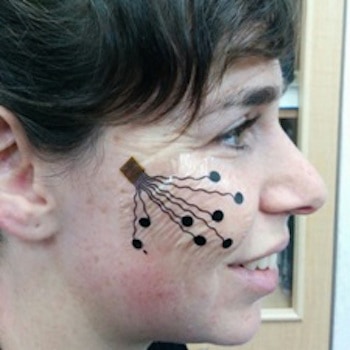‘Electronic tattoo’ collects physiological data for medical and commercial applications
Researchers at Tel Aviv University have developed a wearable skin electrode that measures the activity of muscle and nerve cells, an advance with applications in medicine, rehabilitation, and marketing.

Dubbed the ‘electronic tattoo’, the technology consists of a carbon electrode, an adhesive surface that attaches to the skin, and a nanotechnology-based conductive polymer coating that improves the electrode's performance. In use, the device is said to record a strong, steady signal for a number of hours without irritating the skin.
The electrode, developed by Prof Yael Hanein, head of TAU's Center for Nanoscience and Nanotechnology, could improve the therapeutic restoration of damaged nerves and tissue, and has the potential to provide new insights into peoples’ emotional life by monitoring facial expressions through electric signals received from facial muscles.
"The ability to identify and map people's emotions has many potential uses," Prof Hanein said in a statement. "Advertisers, pollsters, media professionals, and others — all want to test people's reactions to various products and situations. Today, with no accurate scientific tools available, they rely mostly on inevitably subjective questionnaires.
Register now to continue reading
Thanks for visiting The Engineer. You’ve now reached your monthly limit of news stories. Register for free to unlock unlimited access to all of our news coverage, as well as premium content including opinion, in-depth features and special reports.
Benefits of registering
-
In-depth insights and coverage of key emerging trends
-
Unrestricted access to special reports throughout the year
-
Daily technology news delivered straight to your inbox










Breaking the 15MW Barrier with Next-Gen Wind Turbines
Hi Martin, I don´t have any detailed parameters for the 15MW design other than my reading of the comment in the report ´aerodynamic loads at blade-tip...